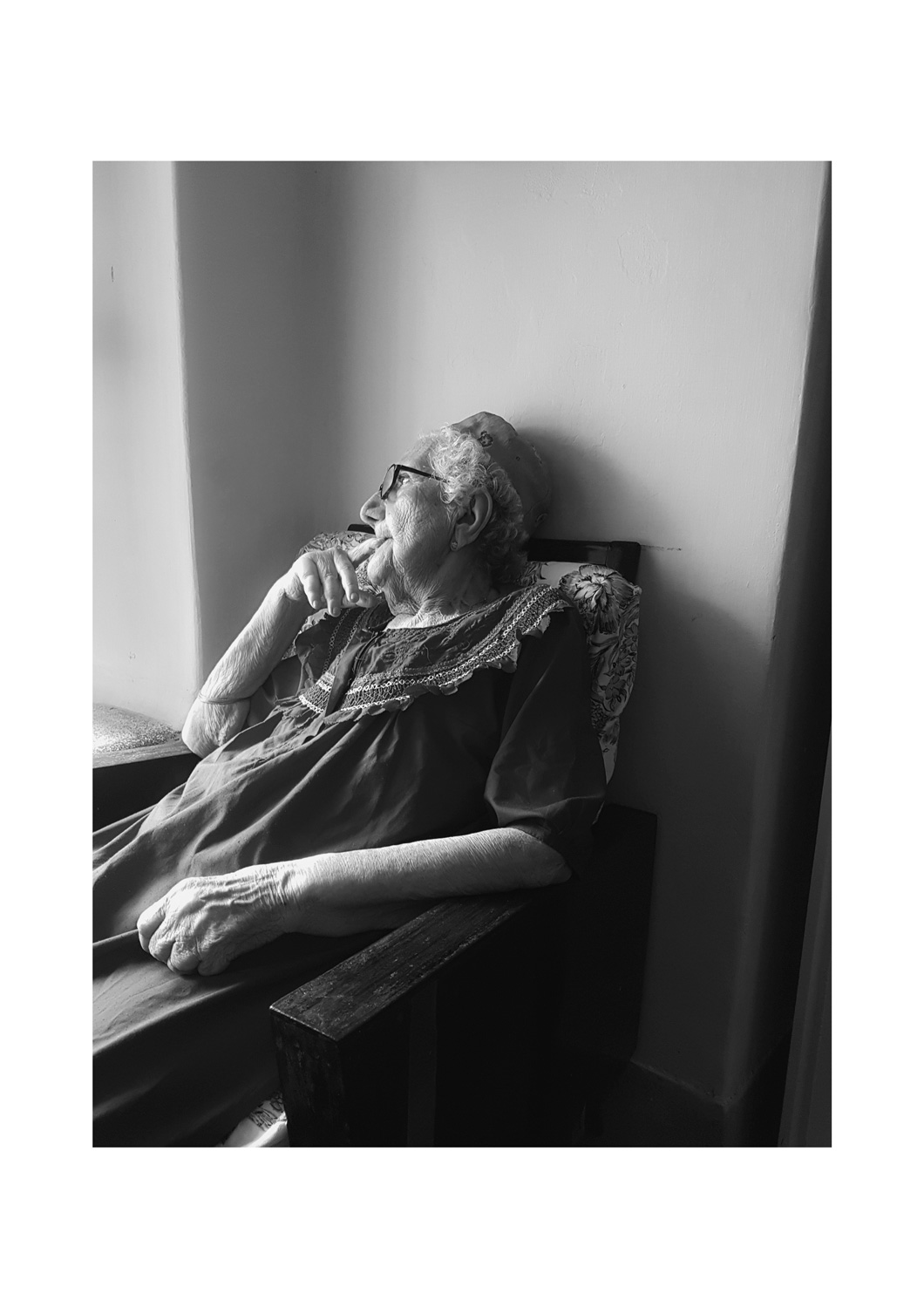“Afternoons By The Window” is a look back at the time I spent with Sarah Jacob Cohen. Sarah Jacob Cohen (1923-2019) was the oldest and best known figure of Kochi’s Jewish community. The photo story highlights the beautiful bond she shared with her muslim caretaker Thaha, who was like a son to her – yet another instance that defies the barriers that we continue to create in the name of religion. – Ritu Arya
Afternoons By The Window – Ritu Arya
[With Sarah Cohen, a beloved figure from the Paradesi Jewish community in India, and her care takers – Thaha and Celin]
I found out about Sarah Auntie right before my first trip to Kochi in 2017, while reading about the city and it’s jewish community settlement in particular. Seeing her absolutely adorable face that reflected nothing but innocence and tenderness, and staring at that child like laugh of hers that you will see in almost all the pieces about her on the internet; I instantly knew I wanted to meet her. And even though it was evident that the doors of her house were open for people to come by, I was a bit hesitant, because who does that – show up at someone’s house, wanting to just see them, making them sound like an artefact. But then just the idea of being there in front of her had me on my toes, and a day after landing there I took off for that side of the town. After wandering about the area for a while, dodging the whole idea for as long as I could, I finally walked into the street and met the dead end with Paradesi Synagogue, standing tall and sleepy in front of me. In another attempt to avoid it, I turned around, walked till the other end, thought for a few seconds and then I finally asked for her. Someone said it’s the green house and I started to drag my feet back towards the synagogue. I remember standing in front of her house, and looking around, not able to find the fluorescent green one that the man told me to look out for. I eventually realised it, took me six minutes but I did. And so I knocked on the door. I cannot remember clearly but I think she was taking a nap then, and Celin, one of her care takers, who opened the door with her beautiful smile, asked me to come back after a little bit. I did like I was asked to. The window in the front of the house was open this time, and the apprehension about this whole adventure kicked right back in. I crossed the window to get to the door, and caught a glimpse of her sitting in the chair, staring outside, as I went unnoticed. Inside there was Thaha who welcomed me and subsequently introduced me to Sarah Auntie, after I gave him my story. Sarah Auntie acknowledged my presence, asked me a couple of things that I didn’t understand and went back to staring outside. I continued chatting with Thaha, who started sharing with me a few of the thousand stories that he has. He would say a few things loudly now and then, asking Sarah Auntie a question or two, trying to make her a part of the on-going conversation, but then she would start a new one each time. By the time I left, I felt as if I’d already become a part of their background. I went back over for two more days during my stay that year. Given her age she was getting a tad forgetful and she wouldn’t recognise me in a few minutes, let alone after a day. So all I did for the next two days was, sit on the floor right next to her chair, watching her look outside the window pondering on things that I would never find out about, and engage with the bits and pieces [mostly disconnected] she would utter now and then. Each day my eyes teared up often, and yes, I do cry easy, I do, but during then it was mainly because my heart was so overwhelmed with the imagination of having lived the interesting life that she did, and because of all these tales Thaha shared – about their bittersweet beginnings when he first started to work with Jacob [Sarah Auntie’s husband], about the festivities, the gatherings in the street when the community was flourishing, and so on. His eye lit up, while he talked about the early days even though he had shared them countless times with several curious people just like me; only to make you realise how deep their bond had grown over the years.
I went back to Kochi in 2019 and I found myself almost sprinting towards her house the same day, without any hesitation this time. Another afternoon and there she was, lost in her thoughts, flipping through the pages of her Siddur, in the chair by the window. Celin was busy embroidering in the other corner of the room. Sarah Auntie’s Kippah and Siddur were kept back on the window sill, after she finished going through a few pages together with Thaha – with her mumbling in her feeble confused voice and asking too many questions and Thaha always answering with a smile and occasional jokes. I took my seat – on the floor, next to her chair. And after sharing some silence together, I left with a heavy heart, not knowing when I would see her again. She passed away later in August the same year. I heard about it through a friend, and did what I mostly do when it comes to death and grief – go quiet. And I didn’t call Thaha. Even though I would go through her pictures on my phone now and then, very often, and hold the kippah I bought from her shop [an exquisite white embroidered one]; I didn’t know how to call. What do you say to a person when they lose someone who was such a significant part of their life, like Sarah Auntie in Thaha’s was? I haven’t figured that out still, but eventually I did give a call to Thaha. He told me about his recent visit to Israel on the occasion of screening of a movie about Sarah Auntie and he now sends me pictures, videos and links to articles/films about her.
In an ideal world I wouldn’t bother highlighting this out, but the key characters of all this belong to different religions – Sarah Auntie a Jew, Thaha a Muslim and Celin a Christian. And let’s not forget the people from different corners of the world, practising different beliefs, who came by to see her and shared moments together, under the same roof, by the same window. And all that one felt was the warmth of love and a sense of connection. So it really continues to be a puzzle, as to when will the fisticuffs about whose-faith-system-will-or-

